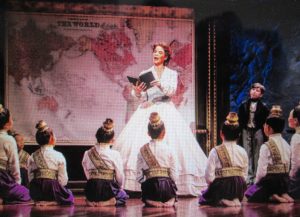My maestra Edith has hit on a new method for getting me to profit from my Spanish homework. She’d learned the hard way that having me memorize verb conjugations and such just didn’t work.
“Nothing sticks!” I’d complain to her, tapping my right temple.
“No te preocupes” (don’t worry), she’d respond soothingly. She is the soul of patience and tolerance.
Now she has me writing stories and translating them into Spanish, something I’m enjoying doing. (Thank you, Google Translate.) I love stories. Don’t we all?
Last week, for example, she asked for a story about a strange (extraño) occurrence (see my previous post, “Strange”), which she did indeed find as suficientemente extraño as I’d hoped.
Her eyes grew wide when I read the story to her in Spanish, and she demanded to know what happened when the Gabonese mother finally reached the Vatican. Did her daughter have the exorcism after all? (I had to admit I never found out.)
This week Edith wants me to write about my experience teaching English at the college level in New Mexico, before I retired to old Mexico. I imagine she wants to learn more about the system of higher education in the States.
So I’ve been dredging my mind for memories of the decade I was an adjunct college instructor – a time, it turns out, I haven’t written much about. Perhaps the reason for my reticence has been that these memories are so muddy and mixed – as mixed as a large class of diverse students can be. And trying to get through to them all, simultaneously, was so immensely challenging and exhausting.
The first hurdle I faced, as a person new to the profession and new to the territory, was that many of my students – freshmen at this community college and the first in their families to attend any kind of college – saw me, an “Anglo” (the term they used for a white person) from the East Coast, as the enemy.
These students, mostly Hispanic and Native American, viewed me through angry eyes as the hated Other, who taught their least favorite subject, English, the language of their forebears’ ultimate conquerors.
It took some doing – and time – to teach these young people about the dangers of stereotyping, of painting whole groups of people with the same broad brush, out of fear and ignorance. I told them true stories about the years I’d spent in Africa before settling in northern New Mexico and all that I’d learned from my African friends, neighbors, and colleagues.
Discrimination, in all its bitter flavors, became a worthwhile topic for class discussion. And in the process of getting to know and trust each other, I liked to think, we all learned some valuable life lessons.
Another hurdle I encountered was that so many of these students were woefully unprepared for college-level English coursework. Had they skipped out on their high school English classes? Had they not bothered to take the remedial courses this community college offered? Had they never (as I suspected) read a whole book from cover to cover? Did they even know how to read – much less write?
While the few better-educated students bore with the rest of us, we began at the beginning with the parts of speech and the important roles they play. I drew pictures of nouns (tree, house, dog…). I acted out verbs (punch, climb, jump…). I made a fool of myself. I didn’t care if they thought I was being ridiculous, as long as I kept their attention.
Some though, sad to say, seemed beyond redemption. They were there, I discovered, because they’d found a way to game the system. Their financial aid, designed of course to help them get an education and advance in their lives, was their temporary ticket out of the work force.
Easy-peasy: Just come to class as infrequently as possible, half asleep, arms folded in front of them, feet sticking straight out (with ankle bracelets on display), and don’t bother to participate or do any homework. Then threaten to go to the Dean and report me if I didn’t give them the required passing grade to ensure the continuation of their financial aid.
“Please go ahead and report me,” I said. “You haven’t earned a passing grade.”
The Dean told me that the Hispanic student who’d threatened me had accused me of racism.
On the plus side, however, I have good memories, too. To see the lights go on behind some students’ eyes in class was an incomparable thrill. To read students’ personal essays about their lives — so different from my own — written from their hearts made my heart nearly burst. To win an award one year, “Most Inspirational Instructor,” was an indescribable honor.
Some lyrics from the song, “Getting to Know You,” from the Broadway musical The King and I have been swirling in my mind:
“It’s a very ancient saying, but a true and honest thought, that if you become a teacher, by your pupils you’ll be taught.”

I learned a lot, both positive and otherwise, as a college instructor. And I wouldn’t trade that learning for anything.
